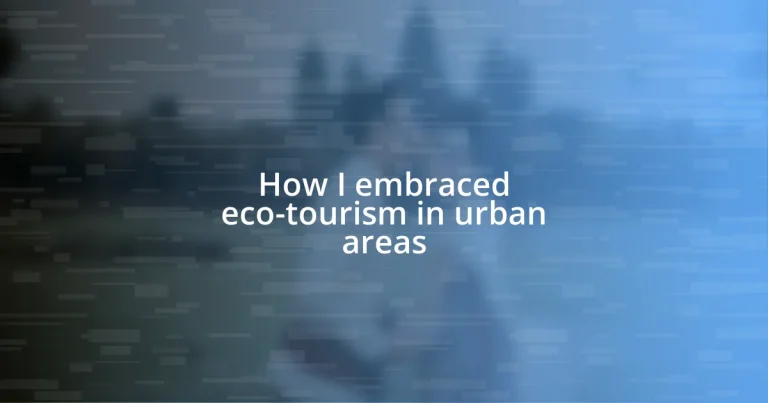Key takeaways:
- Eco-tourism fosters a deeper connection to the environment and supports local economies through mindful travel choices.
- Engaging with community initiatives and sustainable local attractions enriches travel experiences while promoting ecological responsibility.
- Practicing responsible travel habits and measuring eco-tourism impact helps individuals appreciate their contributions to sustainability and inspires further positive actions.

Understanding eco-tourism benefits
One of the most significant benefits of eco-tourism is its ability to foster a deeper connection to the environment. I remember visiting an urban green space that had transformed a vacant lot into a vibrant garden, attracting locals and tourists alike. Have you ever taken a moment to appreciate how such spaces not only beautify a city but also promote biodiversity? It’s remarkable how creating a small haven of greenery can educate us about the ecosystem around us.
Beyond the immediate environmental perks, eco-tourism promotes local economies. In my experience, exploring local markets and supporting neighborhood artisans in an urban setting feels rewarding. It’s inspiring to think about how each purchase contributes to the livelihoods of individuals who care deeply about their communities. Isn’t it empowering to know that our travel choices can have a positive ripple effect?
Moreover, eco-tourism encourages awareness and advocacy for sustainable practices. I’ve seen firsthand how a few hours spent on guided nature walks in the city opened my eyes to conservation efforts that might otherwise go unnoticed. How often do we think about the impact our activities have on the environment? Engaging with passionate eco-tourism guides has a way of igniting a sense of responsibility within us, urging us to become advocates for greener living—both for ourselves and future generations.

Choosing eco-friendly accommodations
Choosing eco-friendly accommodations can transform your travel experience in urban areas. During a recent trip, I opted for a small, locally-owned hotel that prioritized sustainability. The moment I stepped into the lobby, the warm, inviting atmosphere hinted at their commitment to eco-friendliness—the wooden furniture was reclaimed, and they offered organic, locally-sourced snacks. It made me realize that the place we stay can align with our values and contribute positively to the environment.
When looking for eco-friendly accommodations, consider these important factors:
- Sustainable Practices: Check if the hotel implements energy-saving technologies like solar panels or rainwater harvesting systems.
- Local Sourcing: Look for establishments that use local products, supporting farmers and artisans in the area.
- Green Certifications: Many hotels display eco-label certifications, indicating their commitment to sustainable practices.
- Waste Reduction: Examine their policies on recycling and composting; an eco-conscious place often minimizes waste.
- Community Engagement: Some hotels involve guests in local conservation efforts, which can deepen your connection to the area.
Making informed choices about where to stay can truly enhance our travel adventures while nurturing the planet. It’s satisfying to play a part in fostering sustainability, don’t you think?

Discovering sustainable local attractions
Discovering sustainable local attractions can genuinely transform your experience in urban areas. On one particular weekend, I ventured out to a local botanical garden that was not only beautiful but served as an educational hub for conservation. The garden was filled with native plants, and as I walked through the winding paths, each sign informed me about the local ecosystem. It brought back memories of childhood field trips, igniting that same sense of wonder. Have you ever explored a place that made you appreciate nature in a new light?
What stands out most for me is how these local attractions often engage the community. I recall visiting an urban farm where volunteers passionately tended to crops while sharing stories about sustainable agriculture. It was more than just a farm; it was a movement, a way to nurture both the soil and our connections with each other. Participating in a workshop there opened my eyes to how food production can be ethical and community-oriented. It’s a beautiful reminder of the role we can play in supporting local initiatives.
To highlight some contrasting approaches, here’s a comparison of different types of sustainable attractions you might find in urban settings:
| Type of Attraction | Description |
|---|---|
| Botanical Gardens | Focus on plant conservation and education about local ecosystems. |
| Urban Farms | Hands-on experiences in sustainable agriculture and community engagement. |
| Eco-Museums | Interactive exhibits that promote local culture and sustainable practices. |
| Green Parks | Spaces designed to encourage biodiversity and environmental education. |
Diving into these attractions not only enhances our understanding but also allows us to become active participants in fostering sustainability. Isn’t it thrilling to discover that fun experiences can also support a greater cause?

Engaging with community initiatives
Engaging with community initiatives has truly been one of the most rewarding parts of my eco-tourism journey. I recall attending a neighborhood cleanup event organized by a local nonprofit. The vibe was simply electric; everyone was eager to contribute, and it was heartwarming to see young children alongside their parents picking up litter from the park. Isn’t it amazing how such small actions can foster a profound sense of community?
I’ve also participated in workshops held by local artisans who incorporated sustainable practices in their crafts. One memorable session involved creating eco-friendly bags from recycled materials. As I sat there stitching away, I felt a strong connection to the other participants, each of us sharing laughs and stories. Through these initiatives, I realized how engaging directly with the community can enhance our travel experience and further our understanding of local cultures and values.
Moreover, I’ve been fortunate to volunteer with an organization that plants trees in urban spaces. Witnessing that moment when a sapling was placed in the ground—a small, yet meaningful act—made me appreciate the long-term impact of our efforts. It’s a reminder that by getting involved, we can contribute to a greener environment while cultivating bonds with the people in those communities. Have you ever felt that rush of satisfaction from seeing your efforts pay off in tangible ways? Engaging with community initiatives does just that, creating a mosaic of shared experiences and collective responsibility.

Participating in green activities
Participating in green activities has opened up a whole new world for me. One Saturday, I stumbled upon a local park hosting an upcycling workshop, where the atmosphere was filled with creativity and laughter. As I transformed an old shirt into a stylish reusable bag, I couldn’t help but think—how many forgotten items can we repurpose to minimize our waste? It was a practical way to hold on to sustainability while also having fun with others who shared similar interests.
I also had a fantastic experience volunteering for a community garden project. Digging into the rich soil while chatting with fellow volunteers was not just about planting seeds; it was about sowing connections with people from diverse backgrounds. There was something incredibly fulfilling about knowing we were all working toward the same goal—growing fresh produce for local families in need. Have you ever felt the joy of contributing to something bigger than yourself? That day, it felt as if we were planting hope, one seed at a time.
Moreover, I’ve participated in neighborhood bike rides aimed at promoting cycling as a sustainable mode of transport. As we pedaled through the city streets, I felt a rush of exhilaration—not just from the physical activity, but from the shared commitment to reduce our carbon footprint. Isn’t it empowering to think that every small ride counts towards a healthier planet? I returned home that day not just tired but invigorated, knowing that I took part in something meaningful. Participating in these green activities has deepened my connection to my community and the environment in a way I never anticipated.

Practicing responsible travel habits
Practicing responsible travel habits is all about making conscious choices that respect the environment and local communities. I vividly remember my first time using public transport instead of a taxi while exploring a new city. The thrill of navigating local buses and subways wasn’t just adventurous; it opened up a chance to witness everyday life through the eyes of the locals. Have you ever felt the difference when you step away from tourist traps? It’s like discovering hidden gems that enrich your travel experience.
In my travels, I’ve made it a point to support local businesses rather than large chains. I recall the joy of stumbling upon a corner café run by a family who had been part of the neighborhood for generations. The warmth of their hospitality, paired with a delicious home-cooked meal, felt like a true embrace of the culture. Supporting local helps not just the economy but also creates meaningful interactions that you simply can’t replicate in a big franchise. It’s rewarding to think about the impact we can have with our choices—what if we all prioritized local over corporate?
Additionally, I’ve adopted a habit of packing reusable items—anything from water bottles to shopping bags. I recently trekked through a vibrant urban market, armed with my reusable canvas tote. The proud feeling of declining single-use plastic made my experience even sweeter, especially when bargaining with local artisans. I often wonder, how many unnecessary waste products do we bring into the world while traveling? It feels refreshing to know that small adjustments in our travel habits can positively contribute to the planet. Isn’t that a win-win for everyone involved?

Measuring your eco-tourism impact
Measuring the impact of my eco-tourism efforts has been an enlightening journey. I started by keeping a journal of my activities and their outcomes, tracking how often I chose local restaurants or eco-friendly accommodations. Over time, I realized that this simple practice not only heightened my awareness but also made me appreciate the positive changes I was contributing to the community. Have you ever reflected on the footprints you leave behind while traveling? It’s a powerful exercise.
I also calculated my carbon footprint during trips, which really opened my eyes to the environmental costs associated with different modes of transportation. One particularly eye-opening experience was when I compared the footprint of flying versus taking a train on a cross-country trip. The difference was staggering! It made me consider—what choices can I make to minimize my impact on our planet? Every choice count, and I was fueled with a sense of purpose with each step toward more sustainable travel.
Moreover, engaging with local conservation efforts provided a tangible way to measure my impact. When I joined a city cleanup project, I recorded how much waste we collected together. Seeing the filled bags piled high at the end of the day filled me with pride and urgency; it was a vivid reminder of the importance of such initiatives. Has there ever been a moment where you felt the weight of change in your hands? It’s exhilarating to know that with each effort, I’m contributing a little more to cleaner urban spaces and inspiring others to do the same.














